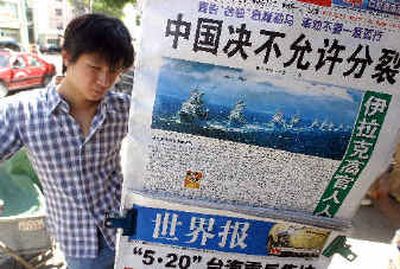Conciliatory speech fails to impress China

BEIJING – Taiwan’s president, Chen Shui-bian, gave a conciliatory inauguration address Thursday designed to defuse tensions with China, but its tone was rejected in Beijing even before Chen spoke.
Chen, beginning his second term in office, has infuriated China by promoting the idea of an independent Taiwanese identity, but in his speech he made several promises and used code words to indicate he recognizes there is a line in the sand he should not cross.
Chen referred to Taiwan several times by its official name, the Republic of China, to tacitly acknowledge that he is not declaring independence, and he stated that his plan to revise Taiwan’s constitution would not address sensitive issues related to national sovereignty, territoriality, unification or independence.
His pledge for his second term, he said, is to “stabilize cross-strait relations” while defending the island against the military threat from China.
The two sides split after the communist revolution takeover of the mainland in 1949, but Beijing has never surrendered its claim on Taiwan. It insists that the island must eventually reunify and it has threatened to invade if Taiwan ever officially declares independence.
As a democracy and vibrant market economy, Taiwan is forging its own identity under Chen, which is what concerns Beijing. China has attacked Chen for many of his initiatives, including proposing that Taiwan revise its constitution during his second term.
In his inaugural address, Chen said Taiwan’s constitution is outdated because it was written decades before the island embraced democracy. But he said explicitly in his speech that his plans for the constitution would not deal with independence or any issue that roils China. He also avoided describing the process as “revising” the constitution, calling it a “re-engineering project.”
Chen also called on the two sides to find ways to cooperate and improve their relationship, warning that a freeze in relations would “only serve to drive the hearts of the Taiwanese people further away and widen the divide.”
A thaw in relations is unlikely in the short term because Beijing insists that the basis for any negotiation is that Taiwan capitulate and acknowledge that it is part of China.
The Chinese government seemed to expect very little from Chen’s inauguration, using scholars to send a message beforehand that Beijing “is not interested nor does it care” what Chen said in his speech.
“That’s because the mainland has seen through Chen’s nature,” the English-language China Daily said Thursday. It called him a politician “who clings to a separatist stance and is notorious for his bad faith and lack of political credibility.”
Chinese officials, who did not react immediately to Chen’s speech, used state-run media in the days before the inauguration to repeat threats that Chen’s apparent march toward independence would lead to military confrontation.
One Beijing scholar was quoted saying that China will “firmly crush” any push for independence at any cost, even if it means “a reversion in Sino-U.S. ties and the boycott of the Olympic Games.”